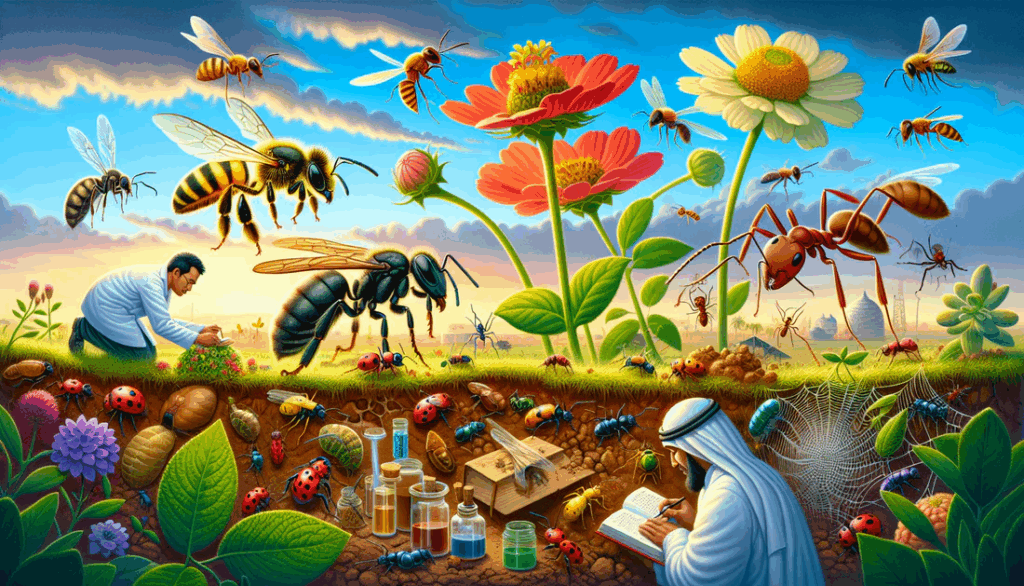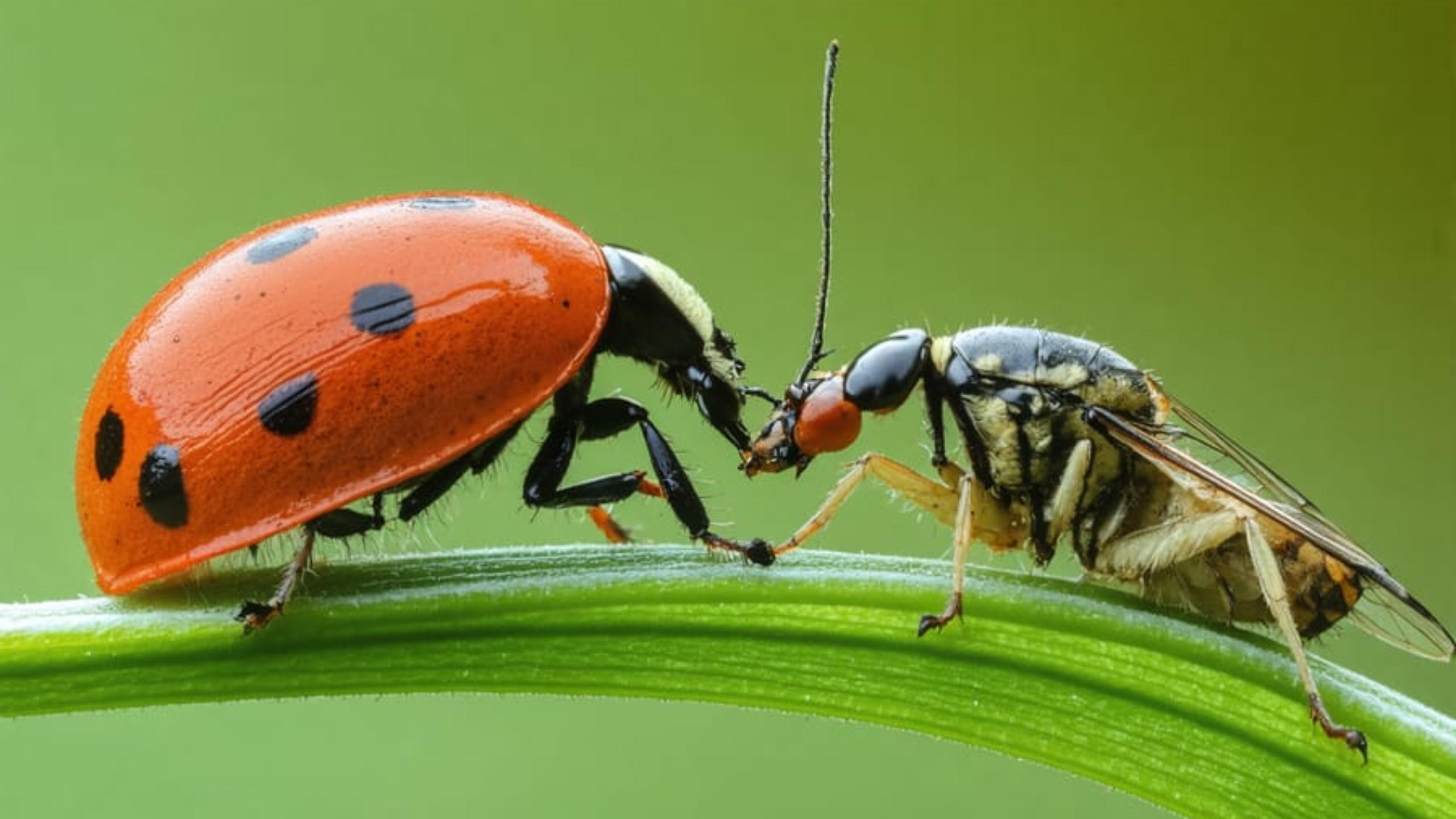In any healthy ecosystem, each creature, no matter how small, plays a vital role in maintaining balance. In your garden, pests like mosquitoes, caterpillars, gnats, ants, and larvae may seem troublesome at first, but they are key players in the natural web of life. When we resort to pesticides to eliminate these so-called “pests,” we are inadvertently disrupting the balance that these creatures help create.
Let’s take a closer look at how these garden pests contribute to a thriving, biodiverse environment—and why embracing nature’s balance is far more beneficial than relying on chemicals.
The Role of Pests in the Ecosystem
Many gardeners are familiar with the frustration of pests that damage plants. However, what often gets overlooked is that these pests also provide food for a variety of beneficial species. Insects like mosquitoes, caterpillars, and gnats serve as crucial food sources for birds, especially insectivorous species. Birds that feed on these pests help control their populations naturally, reducing the need for artificial intervention.
Additionally, these pests are also essential for the survival of pollinators such as bees and butterflies. Without these insects, pollination would be severely disrupted, leading to a decline in fruit and vegetable production. Therefore, pests do not just exist to harm plants—they play a role in sustaining life on multiple levels in the ecosystem.
The Harm of Pesticides: A Break in the Chain
Using pesticides in the garden may seem like a quick fix, but it has unintended consequences. When we apply chemical treatments to rid our gardens of pests, we are not just targeting the insects we find annoying—we’re also eradicating entire populations of beneficial creatures that rely on these pests for food. This action causes a domino effect throughout the food chain, weakening the entire ecosystem.
By eliminating pests with pesticides, we also endanger the birds, pollinators, and other wildlife that depend on them for survival. This disrupts the delicate balance of nature and makes gardens more vulnerable to imbalances and environmental stressors.
The Benefits of a Chemical-Free Garden
A garden without chemicals is not only safer for the environment but also creates a sanctuary for wildlife. By choosing to avoid synthetic pesticides, we can create a haven where plants, insects, and animals coexist harmoniously. This natural balance helps to foster resilience in the garden, as the ecosystem works together to maintain healthy growth and biodiversity.
Chemical-free gardens attract pollinators, beneficial insects, and even small mammals, all of which help keep pests in check naturally. In fact, many gardeners report that over time, their gardens become more self-sustaining, with fewer pest problems as the ecosystem stabilizes.
Creating a Wildlife-Friendly Garden

Creating a refuge for biodiversity in your garden doesn’t require a lot of effort—it’s about making mindful choices. Here are a few simple steps to start building your own chemical-free, wildlife-friendly garden:
- Plant Native Species
Native plants are adapted to the local environment and attract native pollinators. By planting native species, you’re creating a habitat that supports local wildlife and promotes biodiversity. - Encourage Beneficial Insects
Not all insects are harmful. Many, such as ladybugs and lacewings, feed on garden pests. Planting flowers like daisies, sunflowers, and lavender will attract these beneficial insects, helping to reduce pest populations naturally. - Provide Shelter for Wildlife
Add birdhouses, insect hotels, and small brush piles to provide shelter for wildlife. These spaces will give animals a place to rest and nest, contributing to a healthier ecosystem. - Compost to Enrich the Soil
Composting is a natural way to enrich your soil without relying on chemicals. Organic matter from food scraps, garden waste, and leaves helps maintain healthy soil that supports plant growth and attracts beneficial organisms. - Use Natural Pest Control
Instead of reaching for chemical sprays, try natural pest control methods like neem oil, garlic sprays, or introducing predators like birds and beneficial insects that naturally eat pests.
The Long-Term Benefits of Embracing Nature’s Balance
By choosing a chemical-free approach to gardening, you’re not just protecting the environment—you’re contributing to the overall health of the planet. Healthy gardens with a rich diversity of life are more resilient to climate change, diseases, and pests. They support pollinators that are vital to food production and create a more sustainable environment for future generations.
As gardeners, we have the opportunity to take a step back and work with nature rather than against it. By supporting the role of pests in your garden, you are fostering a balanced, resilient ecosystem that thrives without the need for artificial chemicals.
Conclusion: Let Nature Lead the Way
The idea of “pests” is often misunderstood, as many of these creatures are actually working hard to support the health of your garden. Instead of turning to pesticides, embrace the natural balance that exists within your garden. A chemical-free garden is not only safer for wildlife, but it also nurtures a thriving ecosystem that benefits you, your plants, and the environment.
By respecting and protecting the biodiversity that exists in your garden, you create a vibrant, self-sustaining space where life can flourish naturally. Choose to create a sanctuary for both your plants and the wildlife that calls your garden home.
Happy gardening, and may your garden thrive naturally! 🌿🐦


cost amoxil – order amoxicillin pill amoxil pills
cheap diflucan 200mg – https://gpdifluca.com/ cost diflucan 100mg
brand cenforce – https://cenforcers.com/# buy cenforce no prescription
buy cialis tadalafil – https://ciltadgn.com/ tadalafil generic 20 mg ebay
cialis 20 mg best price – strong tadafl dapoxetine and tadalafil
zantac 300mg for sale – click ranitidine order
buy viagra 100 mg online – click viagra sale calgary
I am in truth delighted to gleam at this blog posts which consists of tons of useful facts, thanks representing providing such data. https://buyfastonl.com/azithromycin.html
More peace pieces like this would urge the интернет better. https://ursxdol.com/augmentin-amoxiclav-pill/
More posts like this would persuade the online play more useful. https://prohnrg.com/product/metoprolol-25-mg-tablets/
More peace pieces like this would make the web better. https://ondactone.com/simvastatin/
Greetings! Very serviceable advice within this article! It’s the petty changes which will espy the largest changes. Thanks a a quantity in the direction of sharing!
hyzaar online buy
The thoroughness in this draft is noteworthy. http://ledyardmachine.com/forum/User-Nkqdww
forxiga for sale – https://janozin.com/ order dapagliflozin 10 mg generic
buy orlistat tablets – orlistat generic xenical 120mg tablet
With thanks. Loads of expertise! https://www.forum-joyingauto.com/member.php?action=profile&uid=49441
You can keep yourself and your family by way of being alert when buying prescription online. Some pharmaceutics websites control legally and offer convenience, privacy, rate savings and safeguards over the extent of purchasing medicines. buy in TerbinaPharmacy https://terbinafines.com/product/zetia.html zetia
More peace pieces like this would make the интернет better. TerbinaPharmacy
I’ll certainly carry back to skim more.
https://t.me/officials_pokerdom/3418
https://t.me/s/be_1win/559
**mitolyn official**
Mitolyn is a carefully developed, plant-based formula created to help support metabolic efficiency and encourage healthy, lasting weight management.
online casino usa real money
real casino real money canada
online casinos usa
bet mgm md betmgm-play va betmgm
As a outstanding prominence in sweepstakes casinos, wow vegas casino login provides an universal library of games and frequent bonus drops. Millions tease joined for its fair structure, effortlessly redemptions, and purely entertainment-driven experience.
Explore endless avenues of entertainment and earnings. crowns coins guarantees audited games for true fairness. Enter, entertain, and exit richer!
Sweet Bonanza is a visual and winning delight packed with fruits and candies. Trigger sweet bonanza casino free spins and stack multipliers for epic payouts. Sweet dreams await!
Stampede toward glory with every thrilling spin. mega power buffalo delivers sunset scatters, unlimited free games, and gold collection jackpots for endless rewards. Play today!
New to Chumba? You’ll get macumba just for creating an account. Spin incredible slots and turn Sweeps into real prizes — try it today!